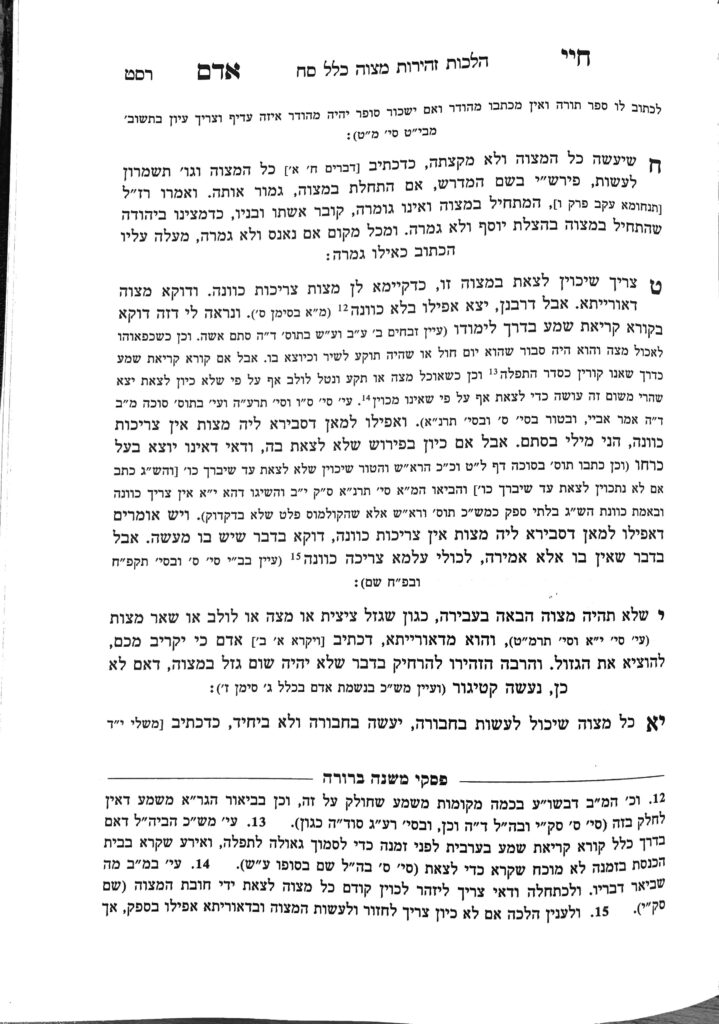We are continuing in siman 11, discussing the concept of b’rov am hadras melech. We learned that the Chayei Adam considers three people b’rov am, and the Eshel Avraham says that 10 is considered b’rov am. We left off with the question of whether there is an advantage to joining a larger group over a smaller one, even if both groups reach the minimum threshold of b’rov am. Today, we will discuss some of the sources regarding this question.
- The Gemara in Rosh Hashanah says that we wait to do tekias shofar on Rosh Hashanah until Mussaf because of b’rov am. Clearly, the Gemara is referring to where there was a minyan for Shacharis, yet waiting for more people is still a form of b’rov am.
- The Mishnah in Brachos says that three people who ate together cannot separate, but must recite birchas hamazon together with a zimun. The Mishnah says that four or five people cannot separate either, but six people can separate into two groups. 10 or more people cannot separate until they are 20. The Darchei Moshe holds that the mishnah is discussing a bedieved situation, because the advantage of b’rov am is preferable. The Taz disagrees, and holds they could separate. The Mishnah Berurah mentions both opinions, but in the Shaar Hatziyun brings support for the Darchei Moshe.
- There is a Magen Avraham, regarding the halachos of a shul, where he says that if a community has one shul which can hold everyone, it is assur to separate into another shul, because of the concept of b’rov am.
- Rav Moshe discusses two people who have a chiyuv to daven for the amud in a shul which is large enough to split into two minyanim. Rav Moshe writes that they should not separate, and one person should daven and the other should say kaddish.
The Darkei Teshuva disagrees completely, and holds that once the threshold for b’rov am has been reached, there is no additional advantage to b’rov am. He asks on himself from the Magen Avraham in hilchos Purim who says that one should join the main minyan for krias hamegillah, because of b’rov am, and explains that megillah is unique, because of the concept of pirsumei nisa. Otherwise, there is no advantage once the threshold of b’rov am has been reached.
Thus, we see that the question of whether there is an advantage to a larger group over a smaller one once both groups have reached the threshold for b’rov am seems to be a machlokes. But we see there are multiple sources that there is an advantage.
Returning to our question regarding kiddush levana, we learned the Mishnah Berurah’s opinion that if one can recite kiddush levana earlier, as long as there are three people, a person should recite kiddush levana and not wait for a larger group later. It is possible that kiddush levana is an exception, because there is also a conflict between b’rov am and zrizin makdimin. Therefore, if the question is between reciting kiddush levana individually now or with a group later, it is preferable to wait for the group in order to gain the advantage of b’rov am. If however, one already has a group, even if it is only three, the advantages of a minimal b’rov am and zrizin makdimin are preferable over a greater b’rov am which will lack in zrizin makdimin.
Summary
It is a machlokes whether there is an advantage of b’rov am to a larger group once the minimum threshold has been reached. It appears that in most cases there is an advantage. Kiddush levana is an exception, due to the additional concept of zrizin makdimin.



